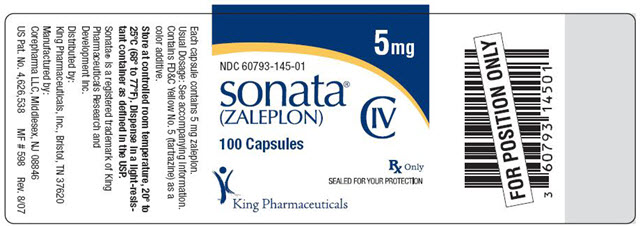Sleeplessness and Prescription Sonata
Cure Sleep Onset Insomnia
Sonata, generically known as zaleplon, is a non-benzodiazepine sleep aid useful in treating insomnia. Brand name Sonata is manufactured by King Pharmaceuticals maker of dozens of other products.
Insomnia is a frustrating problem and it affects millions of Americans annually, some who try to actually live with it. Insomnia is not a disorder but a set of symptoms that often are secondary to something else, such as depression or anxiety. But there are some very good prescription sleep aids created specifically to combat insomnia. Sonata was developed to help insomnia sufferers suited to a relatively short-term treatment, kickstart their biological clocks.
Uses for Sonata

Doctors have found Sonata most useful in treating sleep onset insomnia and possibly middle insomnia in both transient and chronic sufferers. The drug is super fast-acting and offers just the right amount of sedation necessary to put you in dreamland far sooner than you have perhaps anytime recently. Unlike some of its competitors Sonata may be used for a month or so with fewer risks for serious side effects.
Because Sonata is so short-lived in your body – called ‘half-life – the drug is relatively useless for treating late insomnia or for patients who wake early in the wee hours of the morning unable to return to sleep. At this point in the night Sonata has long worn off.
How it Works
The 24-hour circadian rhythm is a complex neurological architecture that involves careful metering of your biological clock in sync with the natural world. When this clock is thrown out of whack your sleep-wake cycle is disrupted. In the short term this may be an easily remedied nuisance, but in the long run can be the root cause for serious illnesses and affect your life, job and relationships.
Sonata provides a drug to the brain, stimulating a neurotransmitter, which acts as a gateway for sleep-inducing chemicals. Sonata allows your brain to introduce more of this natural sedative so you can go to sleep fast and get back into the sleep-wake cycle.
Sonata Side Effects and Risks of Use
If Sonata sounds benign, it’s not. You still run some of the same side effect risks inherent with other powerful prescription sleep aids, including:
- headaches
- nausea
- dizziness
- risk for addiction
- risk for overdosing
- easily abused
Take Sonata under the supervision of a doctor and follow all dosage instructions.
